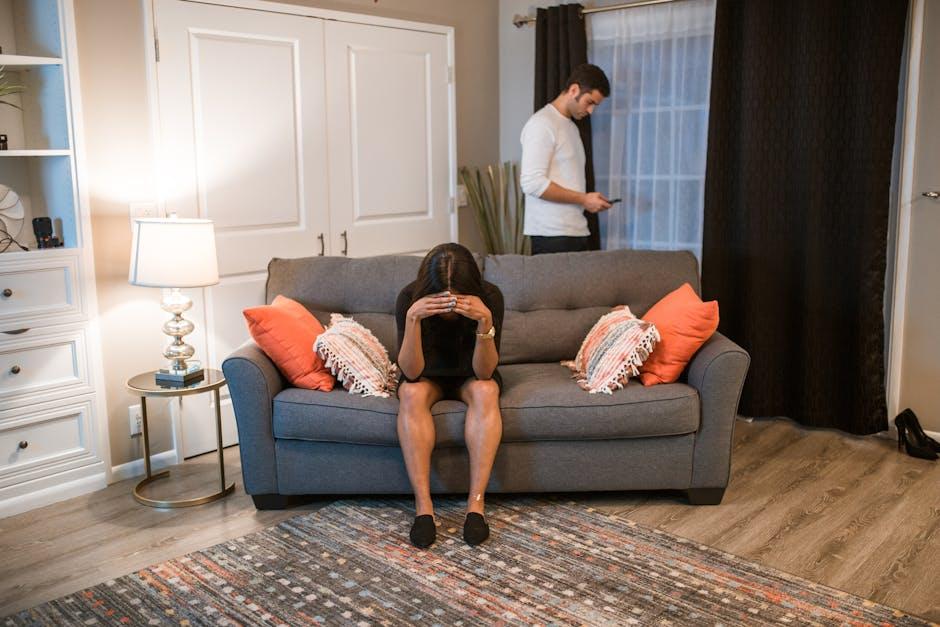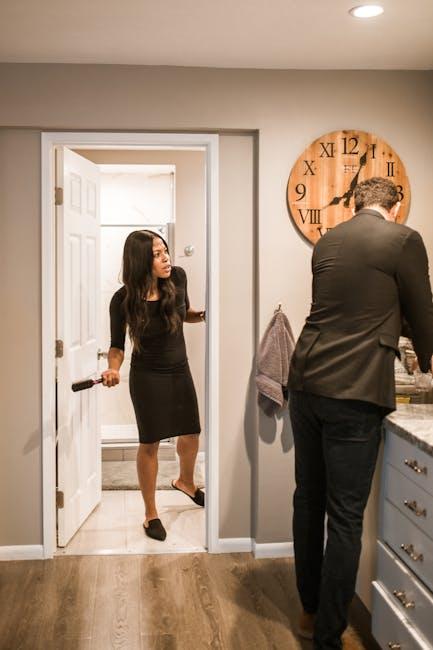When a relationship ends, the emotional journey is often complicated, but the practical steps that follow can be just as crucial. One important yet often overlooked task is home rekeying-a simple yet powerful act that marks a new chapter and protects personal security. Whether it’s a divorce or a breakup, changing the locks can provide peace of mind and a fresh sense of control over your personal space. In this article, we explore why home rekeying is a necessary step after parting ways, how it works, and what to consider to ensure your home remains a safe sanctuary during life’s transitions.
Table of Contents
- Understanding the Importance of Rekeying for Security and Peace of Mind
- Evaluating When to Rekey After a Relationship Ends
- Choosing the Right Locksmith and Rekeying Options for Your Home
- Step-by-Step Guide to Rekeying Your Locks Efficiently
- Additional Safety Measures to Complement Your Rekeying Process
- Q&A
- The Conclusion

Understanding the Importance of Rekeying for Security and Peace of Mind
Regaining control over your personal space after a relationship ends is crucial, and changing the locks is a fundamental step in securing your home. Often overlooked, rekeying ensures that former partners or anyone with old key copies no longer have unauthorized access. This process not only enhances physical security but also offers a psychological reassurance that your sanctuary is truly yours again. Peace of mind comes from knowing that every turn of the lock is safeguarded by your decision to reclaim your environment.
Implementing rekeying after a breakup offers more than just protection; it symbolizes a fresh start. When initiating this, consider:
- Prompt action-don’t delay the rekeying process to prevent any security gaps.
- Professional service-a locksmith can provide expertise and additional security recommendations.
- Upgraded locks-while rekeying, assess whether to install updated locking systems.
| Benefit | Explanation |
|---|---|
| Security Assurance | Old keys are invalidated to prevent unauthorized access. |
| Cost-Effective | Rekeying is often cheaper than replacing all locks. |
| Quick Process | Typically completed in under an hour by a locksmith. |
| Empowerment | Provides emotional closure and renewed ownership. |

Evaluating When to Rekey After a Relationship Ends
Determining the right moment to change your locks after a breakup or divorce often depends on the dynamics of your previous relationship. Consider rekeying your home if there’s any chance your ex-partner or their acquaintances still possess keys. This is especially crucial if there were trust issues, or if your separation was sudden or contentious. Additionally, if you share custody or have mutual friends who visited your home, leaning toward rekeying can provide peace of mind and reinforce personal boundaries.
Another key factor is the evaluation of alternative security measures that might suffice temporarily. For some, simply retrieving all spare keys and changing security codes might work, but for others, a full rekey or lock replacement is necessary. Use the table below to quickly assess whether a full rekey is advisable based on common scenarios:
| Scenario | Recommended Action |
|---|---|
| Ex has a spare key and no longer lives nearby | Rekey locks immediately |
| Keys were exchanged but relationship ended amicably | Consider changing security codes; monitor access |
| Multiple neighbors or friends have access | Rekey or upgrade locks |
| Only digital locks with unique codes | Update access codes and passwords regularly |

Choosing the Right Locksmith and Rekeying Options for Your Home
Selecting a locksmith who is not only skilled but also trustworthy is crucial when reclaiming the security of your home. Opt for professionals with solid local reputations, verified reviews, and transparent pricing. A well-chosen locksmith will offer flexible rekeying options tailored to your unique lock system, family size, and budget. Don’t hesitate to ask about emergency services, certifications, and warranties-these details can make a significant difference in your peace of mind during such a sensitive transition.
Understanding your rekeying choices can simplify the decision-making process. Here’s a quick overview of common options locksmiths offer:
- Standard Rekeying: Changing internal pins so old keys no longer work.
- Master Key Systems: Allowing multiple key levels for selective access.
- Electronic Rekeying: Upgrading to smart locks with keyless entry.
| Option | Best For | Estimated Cost |
|---|---|---|
| Standard Rekeying | Most homes | $50 – $150 |
| Master Key Systems | Shared access situations | $100 – $300 |
| Electronic Rekeying | Tech-savvy homeowners | $150 – $500+ |
Armed with this knowledge, you can confidently choose a locksmith who not only rekeys your home but also restores your sanctuary with precise care and professionalism.

Step-by-Step Guide to Rekeying Your Locks Efficiently
Begin by gathering all necessary tools-a screwdriver, key extractor, and new pins tailored for your lock model. First, remove the lock cylinder carefully and place it on a clean surface. Use a follower tool to push the plug out, exposing the old pins, which must be fully removed to prevent any old keys from working. This ensures your new security setup is effective and reliable.
Next, select new pins based on the new key’s cut depths, inserting them into the plug’s chambers to perfectly align with the new keys’ profile. Reassemble the plug into the cylinder, then test the new key smoothly enters and turns the lock. Here’s a quick checklist to keep handy during this process:
- Remove old pins completely to disable previous keys
- Match pin sizes with new key cuts for perfect alignment
- Test new key before reinstalling the lock
- Keep spare keys for trusted family or security needs
| Step | Tools Needed | Key Action |
|---|---|---|
| 1 | Screwdriver, follower | Remove lock cylinder |
| 2 | Pinning kit, new keys | Replace old pins with new |
| 3 | Plug reassembly tools | Reassemble and test key |

Additional Safety Measures to Complement Your Rekeying Process
While changing your locks is a crucial first step, it’s equally important to reinforce other layers of your home security system to ensure complete peace of mind. Consider installing a robust security alarm system and upgrading to smart locks that offer keyless entry with customizable access codes. These upgrades give you greater control over who can enter your home and when, especially in situations where temporary or limited access is needed without handing out physical keys.
Additionally, don’t overlook simple yet effective deterrents that can complement your rekeying efforts. Motion-activated outdoor lighting, security cameras, and reinforced door frames bolster your home’s defenses without major renovations. Below is a quick overview of practical safety measures to consider alongside your lock change:
- Smart locks with remote monitoring
- Security alarm systems with mobile alerts
- Motion-activated outdoor lighting
- Video doorbells for real-time visibility
- Reinforced door frames and strike plates
| Safety Measure | Benefit |
|---|---|
| Smart Locks | Remote access control and keyless entry |
| Security Alarms | Immediate alerts to your phone and authorities |
| Outdoor Lighting | Deters unwanted visitors by eliminating dark areas |
| Reinforced Door Frames | Enhances physical resistance against forced entry |
Q&A
Q&A: Home Rekeying After Divorce or Breakup
Q1: Why is rekeying the home important after a divorce or breakup?
A1: After a relationship ends, your home’s security can feel compromised. Rekeying ensures that former partners or anyone with old keys can no longer access your space, giving you peace of mind and a fresh start.
Q2: What does rekeying mean exactly?
A2: Rekeying involves changing the internal workings of your existing locks so they work with new keys. It’s like changing the lock’s “password” without replacing the entire lock hardware, often making it a cost-effective security update.
Q3: Should I rekey all the locks in my house or just certain ones?
A3: It’s wise to rekey all exterior doors, including any garage or basement doors, since they provide direct entry points. Interior locks might be less critical unless they secure valuables or sensitive areas.
Q4: Can I rekey the locks myself, or should I hire a locksmith?
A4: While some handy homeowners can rekey basic locks, hiring a professional locksmith ensures the job is done correctly and efficiently, especially if you’re dealing with complex or high-security locks.
Q5: How quickly should rekeying be done after a divorce or breakup?
A5: Ideally, rekeying should be done as soon as possible after the separation to prevent any unauthorized access. Waiting too long increases the risk that former partners still have access to your home.
Q6: Is rekeying expensive?
A6: Rekeying is generally affordable, often less costly than replacing entire locks. Prices vary depending on the number and type of locks but typically fall within a reasonable budget for the added security.
Q7: Could rekeying be part of a broader safety plan post-divorce or breakup?
A7: Absolutely. Rekeying is often just one step. Many also change alarm codes, update security cameras, and notify neighbors or landlords. It all contributes to restoring a sense of safety and control in your living space.
Q8: What if the home is jointly owned-does rekeying require consent from both parties?
A8: Legally, you may need to check local laws or agreements. Some situations require mutual consent, especially if ownership hasn’t been legally settled. It might be best to consult a lawyer before rekeying to avoid disputes.
Q9: How can I balance security with maintaining respect during a sensitive time like a breakup?
A9: Clear communication and mutual agreements help. When possible, discuss security changes calmly or settle these matters through legal channels. Rekeying is about safety, not creating further conflict.
Q10: Are there alternatives to rekeying the locks after a breakup?
A10: Besides rekeying, changing to electronic locks with new codes, installing smart locks, or even full lock replacement are viable options. Each has different benefits and costs, depending on your needs and preferences.
Rekeying your home after a divorce or breakup is a practical step toward reclaiming security and peace of mind. By understanding your options and acting timely, you protect your space and foster a fresh beginning.
The Conclusion
In the quiet aftermath of a breakup or divorce, reclaiming your personal space becomes more than a practical step-it’s a powerful act of moving forward. Home rekeying is not just about changing locks; it’s about redefining security, establishing boundaries, and creating a fresh start within the walls that shelter you. As you turn the key to this new chapter, remember that safety and peace of mind go hand in hand, unlocking not just your door, but the possibilities of a brighter, more secure tomorrow.




